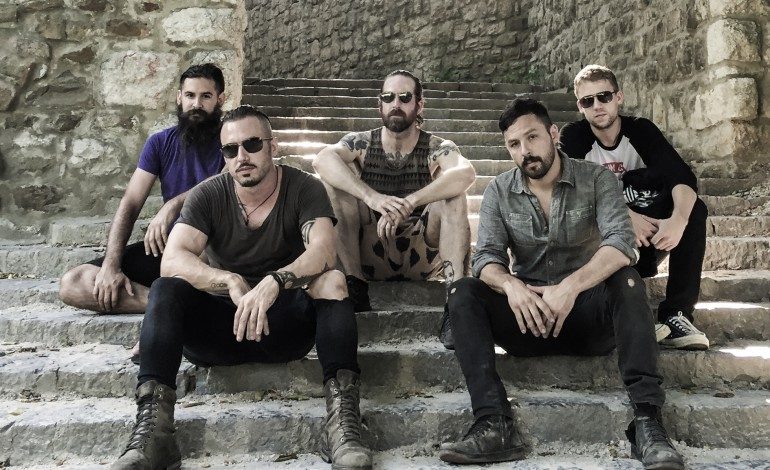

The road from cargo shorts-rocking goofball to bona fide cult hero has proven a lengthy and arduous one for The Dillinger Escape Plan architect Ben Weinman.
It’s been nearly two decades since the guitarist and the first incarnation of his now-seminal group spat out the dizzying barrage of hardcore, metal, and angular math rock that is Calculating Infinity, a record that inadvertently spearheaded the then-novel subgenre of mathcore on its way out of its grimy basement birthplace. But all that musical trailblazing was just stage one; over the course of three drummers, three singers (if we’re counting Mike Patton’s spectacular guest appearance on Irony is a Dead Scene) and far, far too many bassists, Weinman and his ever-expanding crew have built something of a punk empire, complete with a DIY artist collective named for one of Dillinger’s most spastic cuts. The band’s announcement earlier this year that they’d be calling it quits and that their latest LP, Dissociation, would, in fact, be their swansong almost seemed like an elaborate hoax—surely a musical force that had once seemed so unstoppable, so equipped to push through adversities ranging from departing members to sustained injuries couldn’t just pack up and leave us with such little notice.
In keeping with the trend of the year 2016, what seemed preposterous yesterday is, today, all too true and staring us right in face. For their final show at Fete Music Hall in Providence, the gang dredged up a characteristically mixed bag of opening fodder—Dillinger followers tend to be a pretty diverse crop of degenerates, after all. From the ashes of Gaza have risen Cult Leader, a bleak, hardcore-leaning group that’s done much to preserve the subtle shredding and brutal blast beats of their previous outfit with a little help from the guys in Converge. Atlanta’s O’Brother rounded out the line up with the thunderous, Sabbathian riffage conjured by their punishing three-guitar wall.
When DEP took the stage, there was no ceremony. There was no speech, no explanation as to why they’d chosen now to abandon us, facing down Trump’s America and more in need of their guidance than ever (though, chances are, the formation of Giraffe Tongue Orchestra probably has something to do with it). Before the crowd even had a chance to finish their welcoming applause, Dillinger Escape Plan had already torn through the bludgeoning “Panasonic Youth” in a blind fervor. And though they threw older fans a bone with “Sugar Coated Sour” and a teaser snippet of their former flagship tune, “43% Burnt,” the poppier Ire Works cuts heralded what seemed like the crowd’s biggest reactions. Even without all the horns and piano tinkling that distinguish the recorded version, the band’s rendition of “Milk Lizard” hit harder and thrashed more violently than ever—in between the pretty parts, that is. With its arena rock chorus and cheeky crooning, “Black Bubblegum” was practically engineered to be a crowd pleaser. Greg Puciato’s effortless swagger and seamless shifts between throat-rending screams and silky falsetto would have made both Marc Bolan and Rob Tyner proud punk progenitors.
Meanwhile, Weinman was hard at work demonstrating his clear phobia of standing still on stage for too long a period. He was irrepressible, spin-kicking off of speaker cabinets and twirling his guitar by the strap like it was 2001 and nothing had changed. Still diving into the crowd as if he had everything to prove, as if he was just some kid rather than one of the most recognized players in contemporary heavy music for the better part of a decade. Instead of making some grand announcement to fit the end of an era, or even say anything at all, he opted to swat his microphone and stand to the floor before leading the cavalry charging into the faux-jazz minefield of “When I Lost My Bet.”
The boys treated fans to a handful of new songs from their latest record, including the stompy, mid-paced “Limerent Death” and the brooding slow-burner “Symptoms of Terminal Illness,” but the set highlight was one no one would have expected. When the clean arpeggio the hailed the coming of “One of Us Is the Killer” began to echo outward, some strange presence took hold of the show. The quiet, haunting moment stood out in an evening of unrelenting, disorientating chaos, and as the mosh pit came to a standstill this short, tranquil moment of near-stillness seemed to last longer than the previous ten songs. The innocuous title track then seemed more dirge-like, as if some weight had been fastened around Dillinger’s collective neck and grown with every hit and stutter-step fill. “One of us must die,” Puciato shouted at us for the final time, “but the killer will survive.”
But which one of us would die? Before we could beg them to stay or confess all the hours we’d all spent in our bedrooms trying to play their complex polyrhythms and understand their obtuse lyrics, The Dillinger Escape plan distributed paltry hi-fives to the front row and vanished from the spotlight. We were left standing there, covered in sweat and thrown beer, contending with the very real possibility that we’d never see another band like them again, hoping against hope that this breakup thing was just a cheap ploy to get the kids to come out, despite Greg’s emphatic insistence.
Here’s to you, Dillinger. Thanks for the uncompromising tunes, sprained wrists and fond memories.
